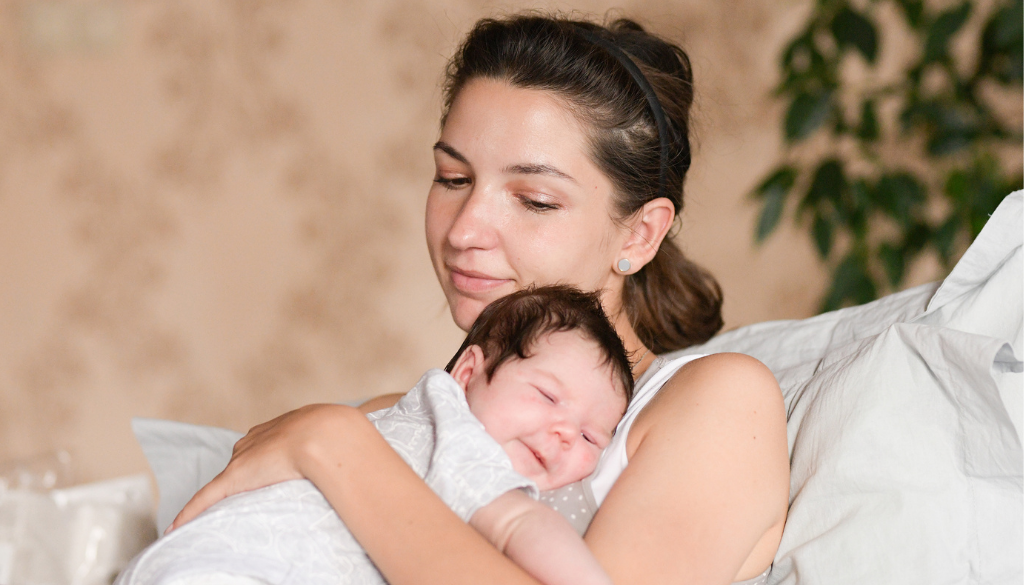Let’s Get Real About Postpartum at Home
Let’s be frank: Your body has been through a lot. Childbirth is one of the most challenging – and rewarding—experiences in life.
But after you embrace your bundle of joy for the first time, your own recovery begins.
We want you to know what to expect for your recovery after birth and provide some important tips and information that can help you.
“Our care for you doesn’t end once the baby arrives,” said Leigh Ann Joel, CNM. “We are with you through every step of the postpartum period. You’ll find that your body goes through many changes during this time, and we want to assure you that we are always available to answer any of your questions.”
What Is Postpartum Recovery?
The first six weeks after delivering your baby are considered a postpartum recovery time. Regardless of whether or not you had an easy or challenging delivery, this is a time for your body to rest and experience recovery after birth.
How long this process takes depends on each individual. Many issues may clear up within a week or two, while others—such as perineal pain—may linger longer.
If you had a C-section, it may take between three to six weeks to get back to your regular routine.
Some of the things you may experience during this postpartum recovery time are:
- Sore nipples
- Backaches
- Perineal pain (particularly if you tore or had an episiotomy)
- Leaky breasts
- Vaginal pain
We can help you manage these situations to ensure your recovery after birth goes well.
Tips for Postpartum Recovery at Home
We will want to see you after your delivery to ensure that you are healing and recovering well. However, we also want to share these useful tips to help you while you’re at home.
Rely Upon Your Support Network
If you have friends and family who are supportive, this is a time to lean on them for help and assistance. However, in light of the COVID-19 pandemic, you should exercise your best judgement on who and how many people you allow to come into contact with you and your baby.
Your support network is there to provide assistance with household chores, errands and even yard work.
Ease Your Pain
This may involve taking over-the-counter pain relievers or taking a hot shower. If these are not successful, schedule an appointment with us so we can work together to find solutions. Sometimes we can use telemedicine to problem solve so that you don’t even need to leave your house.
Eat Well
It’s more important than ever to keep a close eye on your nutrition. Eating fiber-rich foods can help you have regular bowel movements, and a healthy diet can help alleviate fatigue.
Treat Sore Breasts
Many patients find that using either an ice pack or a warm compress can help. Make sure you’re wearing a nursing bra, and apply cream to prevent cracked nipples.
Get up and Move Around
Now is not the time to try to beat your best time in a lap around the neighborhood. However, regular exercise will help your recovery and elevate your mood.
A simple walk around the house may be a good start. We’ll provide guidelines on how to safely exercise after delivery—along with special precautions you should take if you’ve had a C-section.
Keep Your Appointments
Communication and compassion are at the heart of quality health care. By keeping your regular appointments with us, we can see how you are progressing. This way, we can address any concerns before they become health problems.
Besides, we see our patients as members of our own family, and we want to check in to see how you are doing!
What Can I Do About Vaginal Pain After Delivery?
If you had a vaginal tear, recovery can be challenging. We’ll help you by treating these tears with regular follow-ups to be sure healing is taking place.
But what should you do about vaginal pain? Here are a few tips:
- Cool the area with an ice pack.
- Sit on a padded ring, or if you don’t have one, a pillow will also work.
- Sit in a bath that is deep enough to cover your hips. Use warm or cool water—whichever feels better.
- It’s also helpful to use a squeeze bottle to pour warm water over the perineum (the area between the vagina and the rectum), particularly when you’re urinating.
- Over-the-counter pain relievers are also useful, but contact our office if you believe stronger medication is needed. We’ll evaluate your individual case and find solutions together.
If, despite these efforts, you’re still experiencing intense vaginal pain, please schedule an appointment with us so we can provide the relief you need.
How Long Does Postpartum Bleeding Last?
Vaginal discharge and bleeding after birth may last several weeks. This discharge is a part of the process the uterus undergoes as it sheds its mucous membrane.
The bleeding will initially be red for a few days, but the flow will eventually taper. The discharge will also become more watery and transform from pink/brown to yellow/white.
Typically, this will last four to six weeks. However, if you’re soaking a pad in less than an hour, or if you’re experiencing pain or a fever, please contact us to schedule an appointment.
What Causes Postpartum Anxiety?
You’ve just given birth. You’re facing the challenges of caring for a newborn and, in many cases, caring for your other family members as well.
Sleepless nights, exhaustion and regular feedings take priority over your own needs. As a result, it’s not unusual to experience postpartum anxiety.
In addition to the stress that comes with taking care of a baby, there’s a dramatic decrease in the hormones estrogen and progesterone. As a result, you have an increased sensitivity to stress. It’s not unusual to feel panic or fear, especially if you’re a first-time mother.
What are the signs of postpartum anxiety?
- Persistent worry
- The inability to relax
- Obsessive thoughts
- Tension
- Consistent fear that something bad will happen
- Changes in appetite
- Insomnia
Some researchers believe that there is a relationship between postpartum depression and postpartum anxiety. Women who have postpartum depression are more likely to also experience anxiety. However, the reasons for this are not entirely clear.
Speaking of postpartum depression…
How to Cope With Postpartum Depression
The most important thing to remember about postpartum depression is that you are not alone. It is not a character weakness, and it does not mean that you are a bad parent.
What it does mean is that your body is going through many hormonal changes, and you’re facing new challenges. The combination of both can be easily overwhelming.
We want you to know that we have helped hundreds of women address postpartum depression.
Following are some tips to help you cope:
Find Someone You Can Confide In
This could be your partner, a friend or family member. The key is to avoid isolating yourself. This can be difficult because depression often makes you feel like you want to be alone. Therefore, it is even more important to reach out to those who love and care about you. Don’t keep your feelings to yourself.
Move Around
You’ll notice we mention exercise quite a bit. While you’ll likely not be back to your regular routine, we do encourage you to do what you can, even if that is just a bit of walking. Exercise releases “feel good” endorphins which lift your mood.
Put the Housework on Hold
We promise, it will still be there when you feel able to tackle it. Even better, see if you can get someone in your support network to pitch in and help. Spend this time instead to concentrate on your relationship with your baby.
Be Sure You’re Getting Enough Sleep
When you have a newborn, sleepless nights are a part of the job description. However, enlist your partner to help you so you can take a snooze now and then. You may also find it useful to sleep when your baby sleeps.
Remember: You can’t take care of others unless you’re taking good care of yourself.
We Offer Compassionate Care for Every Phase of Your Life
Whether you’ve just given birth, are facing menopause or you’re preparing your daughter for her first GYN exam, we’re here for you.
See why we’ve been named one of the top OBGYN practices in the Triangle area. Contact us to schedule an appointment today.




